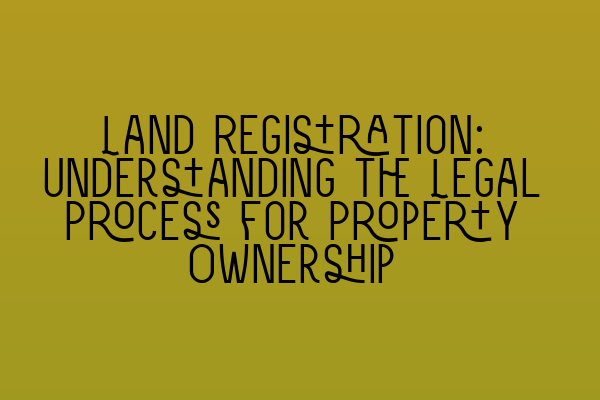Land Registration: Understanding the Legal Process for Property Ownership
When it comes to property ownership, understanding the legal process of land registration is crucial. Whether you are buying a new property, transferring ownership, or dealing with land-related disputes, having a clear understanding of the land registration process can help you navigate through the complexities of property law.
In this article, we will outline the key steps involved in land registration and provide an overview of the legal framework surrounding property ownership. By the end of this article, you will have a solid understanding of the land registration process and its importance in ensuring reliable property ownership.
The Importance of Land Registration
Land registration plays a vital role in establishing legal ownership of a property. It provides a definitive record of who owns the land and any interests or rights associated with it. Without proper land registration, property ownership can be clouded by uncertainty and disputes can arise, leading to lengthy legal battles.
Additionally, land registration offers protection to both buyers and sellers. As a buyer, conducting a thorough land search and verifying the property’s registration status can help ensure that you are dealing with the rightful owner and that the property is free from any encumbrances or claims. For sellers, having a properly registered property can instill confidence in potential buyers and expedite the sale process.
The Land Registration Process
The land registration process in the United Kingdom is governed by the Land Registration Act 2002. This legislation introduced a centralized system managed by the Land Registry, which is responsible for maintaining the land register and recording changes in ownership and other interests.
The process typically involves the following steps:
- Preliminary Checks: Before initiating the land registration process, it is essential to conduct preliminary checks, such as verifying the property address, ensuring that the property is not already registered, and determining if any special circumstances apply.
- Application for Registration: The next step is to complete an application for registration. This requires providing relevant information about the property, including a boundary plan, any existing rights or interests in the land, and details of the applicant.
- Document Verification: Upon receiving the application, the Land Registry will examine the supporting documents to ensure their validity and compliance with the registration requirements.
- Official Search: The Land Registry will conduct an official search against the property to identify any undisclosed interests or restrictions that may affect the registration. This search helps establish a clear picture of the property’s legal status.
- Inspection and Rectification: In some cases, the Land Registry may conduct an inspection of the property or request additional information or corrections to rectify any discrepancies or inconsistencies found during the verification process.
- Registration and Issuance of Title: Once all necessary checks and verifications are complete, the Land Registry will register the property and issue a Title Information Document, confirming the new ownership details. The property is now officially registered, providing a clear and reliable record of ownership.
It is important to note that the land registration process may vary depending on specific circumstances, such as transfers between family members, leasehold properties, or adverse possession claims. Seeking professional legal advice is highly recommended to ensure compliance with the relevant regulations and to navigate any complexities that may arise.
The Role of a Property Lawyer
Engaging the services of a property lawyer can greatly simplify the land registration process and provide invaluable guidance. A property lawyer specializes in property law and can assist with various aspects, including conducting property searches, preparing and submitting registration applications, and ensuring compliance with legal requirements.
Moreover, a property lawyer can help resolve any disputes or issues that may arise during the registration process, such as conflicting claims, boundary disputes, or rights of way. Their expertise and legal knowledge can provide peace of mind and protect your interests throughout the property ownership journey.
Conclusion
Understanding the legal process for property ownership and land registration is essential for anyone involved in buying, selling, or transferring property. Proper land registration provides a clear record of ownership, protects against potential disputes, and fosters confidence in property transactions.
To further enhance your understanding of property law and prepare for exams, consider exploring our related articles and courses:
- SQE 1 Practice Exam Questions
- SQE 1 Practice Mocks FLK1 FLK2
- SQE 2 Preparation Courses
- SQE 1 Preparation Courses
- SRA SQE Exam Dates
By equipping yourself with knowledge and seeking professional legal advice when necessary, you can confidently navigate the intricacies of land registration and ensure your property interests are protected.
